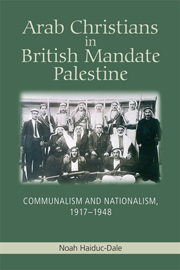Book contents
- Frontmatter
- Contents
- List of Illustrations
- Acknowledgements
- Introduction: Nationalism and Religious Identification
- 1 1917–1923: Balancing Religion and National Unity
- 2 1923–1929: Christians and a Divided National Movement
- 3 1929–1936: Towards Communalism
- 4 1936–1939: Standing Aloof? Arab Christians and the Great Revolt
- 5 1940–1948: National Strength through Communal Unity
- Conclusion: Nationalism and Communal Identification – Conflicting Identities?
- Bibliography
- Index
3 - 1929–1936: Towards Communalism
Published online by Cambridge University Press: 05 October 2013
- Frontmatter
- Contents
- List of Illustrations
- Acknowledgements
- Introduction: Nationalism and Religious Identification
- 1 1917–1923: Balancing Religion and National Unity
- 2 1923–1929: Christians and a Divided National Movement
- 3 1929–1936: Towards Communalism
- 4 1936–1939: Standing Aloof? Arab Christians and the Great Revolt
- 5 1940–1948: National Strength through Communal Unity
- Conclusion: Nationalism and Communal Identification – Conflicting Identities?
- Bibliography
- Index
Summary
We call upon the Muslim world, since the Christian-European world is asleep and does not care for its Holy Places, to act before it is too late if they are really concerned about the fate of the Muslim holy places in Palestine and all other Arab countries.
Emil al-Ghuri (Orthodox Christian), 29 August 1929The Buraq (Western Wall) is a purely Moslem Place and is a part of the Holy Masjid al-Aksa. The rights of the Moslems in the Buraq are indisputable. [And] in the cause of the Buraq the Moslems and Christians are one and the same racially, nationally, and politically.
Yaᶜcoub Farraj (Orthodox Christian), 27 October 1929It was Tuesday, 27 August 1929, just four days after a dispute over al-Buraq (the Western Wall) triggered violent Arab riots and Jewish counter-attacks. Yusef Marroum and his wife (unnamed in police records) of Qalunya, a village of roughly 500 citizens about four miles from Jerusalem, heard a car pull up in front of their house. Marroum slowly opened the shutters to see who had arrived in the otherwise quiet town. He was greeted with a bullet to the face. As he lay bleeding on the floor, he heard boot steps come around to the door and enter. The British soldier fired two more shots before he saw Marroum's wife. As he paused, Yusef shouted out, ‘I'm a Christian!’ The soldier fired once more for good measure, but then left Marroum lying on the floor.
- Type
- Chapter
- Information
- Arab Christians in British Mandate PalestineCommunalism and Nationalism, 1917-1948, pp. 97 - 129Publisher: Edinburgh University PressPrint publication year: 2013



